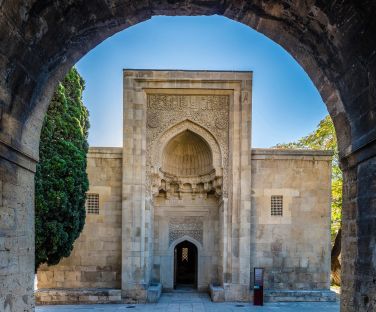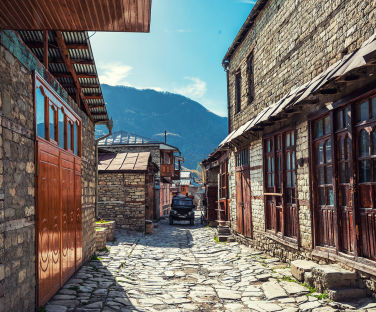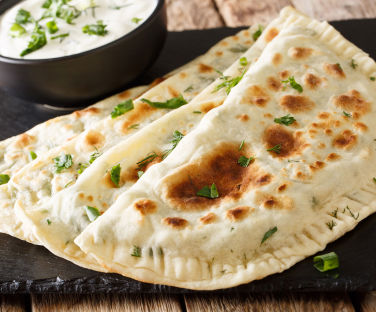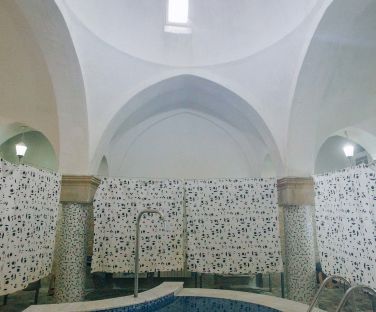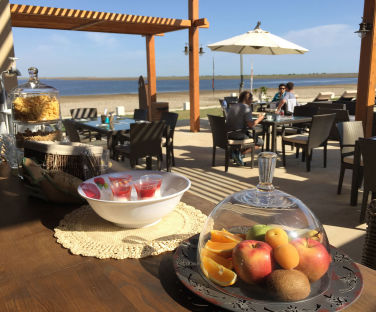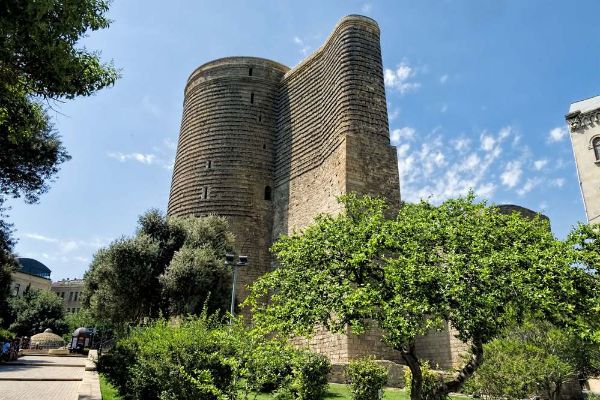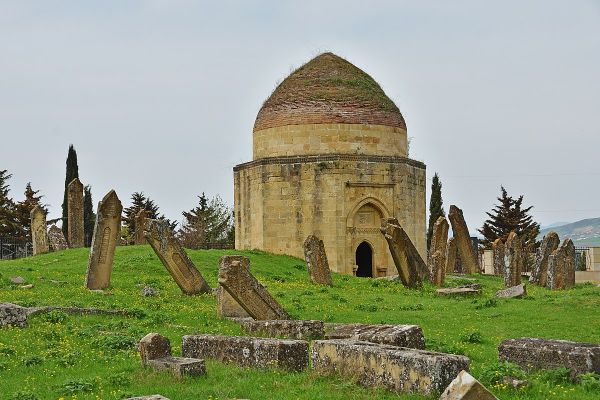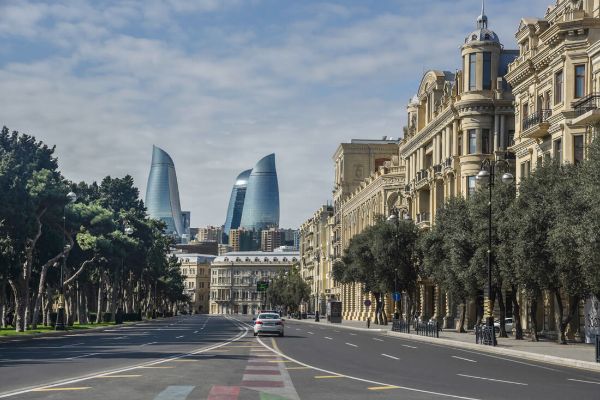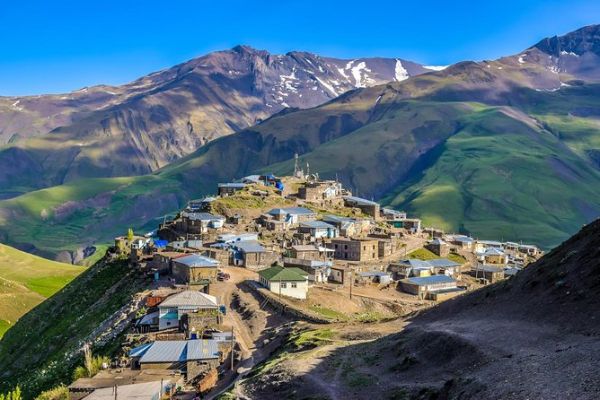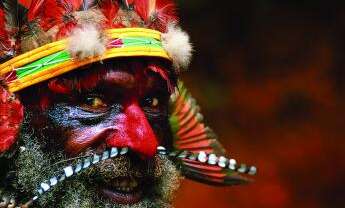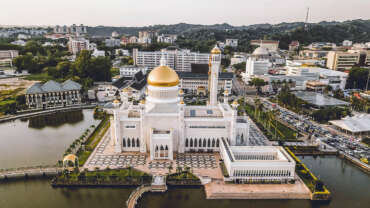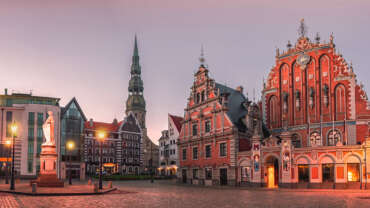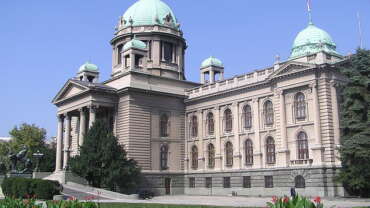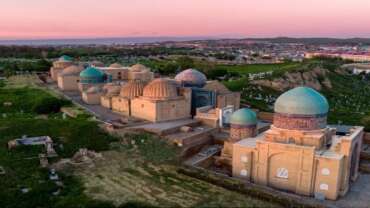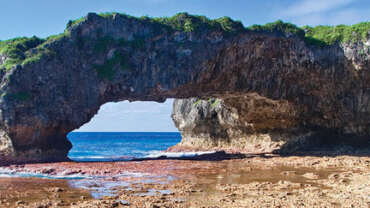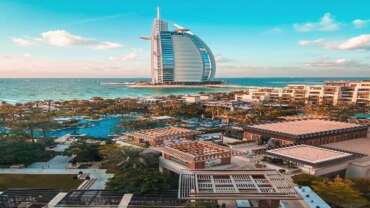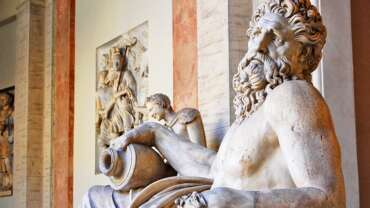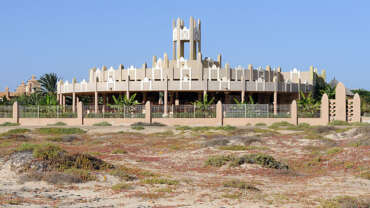Azerbaijan - Take another look!
Azerbaijan, the nation and former Soviet republic, is bounded by the Caspian Sea and Caucasus Mountains, which span Asia and Europe. Its capital, Baku, is famed for its medieval walled Inner City. Within the Inner City lies the Palace of the Shirvanshahs, a royal retreat dating to the 15th century, and the centuries-old stone Maiden Tower, which dominates the city skyline.
Azerbaijan, also spelled Azerbaidzhan, officially Azerbaijani Republic, Azerbaijani Azärbayjan Respublikasi, country of eastern Transcaucasia. Occupying an area that fringes the southern flanks of the Caucasus Mountains, it is bounded on the north by Russia, on the east by the Caspian Sea, on the south by Iran, on the west by Armenia, and on the northwest by Georgia. The exclave of Naxçıvan (Nakhichevan) is located southwest of Azerbaijan proper, bounded by Armenia, Iran, and Turkey. Azerbaijan includes within its borders the predominantly Armenian enclave of Nagorno-Karabakh, which from 1988 was the focus of intense conflict between Azerbaijan and Armenia. The capital of Azerbaijan is the ancient city of Baku (Bakı), whose harbour is the best on the Caspian Sea.
History of Azerbaijan
In ancient and early medieval times, eastern Transcaucasia was populated by Iranian speakers, nomadic Turkic tribes, Kurds, and the Caucasian Albanians, who converted to Christianity in the 4th century and came under the cultural influence of the Armenians. After Arab incursions in the 7th century, Islamic polities were established under local rulers called shāhanshāhs. The Seljuq invasions in the 11th century changed the composition of the local population and resulted in the linguistic dominance of Oghuz Turkic languages. But, unlike the Ottoman Turks who came to dominate Anatolia, the Caucasian Muslims of Azerbaijan in the early 16th century became Shiʿi, rather than Sunni, Muslims, and they continued to develop under Persian social and cultural influence. Persian-ruled khanates in Shirvan (Şamaxı), Baku, Ganja (Gäncä), Karabakh, and Yerevan dominated this frontier of Ṣafavid Iran.
Russian suzerainty
After a series of wars between the Russian Empire and Iran, the treaties of Golestān (Gulistan; 1813) and Turkmenchay (Torkmānchāy; 1828) established a new border between the empires. Russia acquired Baku, Shirvan, Ganja, Nakhichevan (Naxçıvan), and Yerevan. Henceforth the Azerbaijani Turks of Caucasia were separated from the majority of their linguistic and religious compatriots, who remained in Iran. Azerbaijanis on both sides of the border remained largely rural, though a small merchant class and working class appeared in the second half of the 19th century. As Baku became the major source of oil for Russia, tens of thousands of Iranian, Armenian, and Russian workers streamed to the Abşeron Peninsula in search of employment, and Russian economic and political influence could be felt in both parts of Azerbaijan. As the source of employment and the home of the nascent Azerbaijani intelligentsia and revolutionary movement, Baku radiated its influence in Iranian Azerbaijan as well as north of the Aras (Araz) River. No specifically Azerbaijani state existed before 1918, and, rather than seeing themselves as part of a continuous national tradition, like the Georgians and Armenians, the Muslims of Transcaucasia saw themselves as part of the larger Muslim world, the ummah. They were referred to as “Tatars” by the Russians; the ethnonym Azerbaijani (azarbayjanli) came into use in the prerevolutionary decades at first among urban nationalist intellectuals. Only in the Soviet period did it become the official and widely accepted name for this people.
Incorporation into the Russian Empire provided a new outlet for educated Azerbaijanis, some of whom turned from their religious upbringing to a more secular outlook. Prominent among the early scholars and publicists who began the study of the Azerbaijani language were ʿAbbās Qolī Āghā Bāqıkhānlı (Bakikhanov), who wrote poetry as well as histories of the region, and Mīrzā Fatḥ ʿAlī Ākhūndzādeh (Akhundov), author of the first Azerbaijani plays. Though eventually these figures would be incorporated into a national narrative as predecessors of the Turkic revival, a variety of conflicting impulses stimulated early Azerbaijani intellectuals—loyalty to the tsarist empire, the continuing influence of Persian culture, and a longing for Western learning. Although no single coherent ideology or movement characterized the Azerbaijani intelligentsia, by 1905 a growing number of writers and journalists adopted the program of the nationalist intellectual ʿAlī Bay Huseynzadeh: “Turkify, Islamicize, Europeanize” (“Turklashtirmak, Islamlashtirmak, Avrupalashtirmak”).
The town of Baku, which by 1901 produced more than half of the world’s output of petroleum, was complexly segregated, with Russians and Armenians in the central part of the town and Muslims clustered in distinct districts. As social resentments festered, particularly in times of political uncertainty, ethnic and religious differences defined the battle lines; bloody clashes between Azerbaijanis and local Armenians took place in 1905 and 1918. A hierarchy of skills, education, and wages placed Muslims on the bottom and Christians at the top. By virtue of a quota on non-Christian representation and a system of suffrage based on property holdings, the Baku city duma (legislative council) remained in the hands of wealthy Armenians and Russians. Azerbaijanis remained on the fringe of the labour movement and were indifferent to or ignorant of the aspirations of both their socialist and nationalist intellectuals. None of the small parties and political groups that arose after 1905 commanded much of a following beyond the intelligentsia, though Musavat (“Equality”), founded in 1911 and led by Mehmed Emin Rasulzadeh, proved most enduring. Anxiety about the Armenian “threat,” a perception of their own distance from and hostility to this privileged element within their midst, and a feeling that Azerbaijanis were connected in important ways to other Muslims, particularly Turks, became part of an Azerbaijani sense of self.
People of Azerbaijan
Ethnic groups
Turkic-speaking Azerbaijanis (Azeris) make up some nine-tenths of the country’s population; the remaining population comprises only small concentrations of minorities—among them, Lezgians (who speak a Caucasian language), Russians, and Armenians. Ethnic Azerbaijanis combine in themselves the dominant Turkic strain, which arrived in Azerbaijan especially during the Oghuz Seljuq migrations of the 11th century, with mixtures of older inhabitants—Iranians and others—who had lived in Transcaucasia since ancient times. At the end of the 20th century, about 13 million Azerbaijanis lived abroad, most of them in Iran.
At the beginning of the 21st century, the population of the Azerbaijani exclave of Naxçıvan (lying wholly within Armenia) was almost entirely ethnic Azerbaijani, whereas the enclave of Nagorno-Karabakh (lying wholly within Azerbaijan) was predominantly ethnic Armenian. In the Soviet era there were several disagreements regarding the status of the two territories’ placement. After a number of reversals, the Soviet government provided that Naxçıvan was to be recognized as an Autonomous Soviet Socialist Republic (A.S.S.R.) with close ties to Azerbaijan, while Karabakh was to remain within the Azerbaijan S.S.R. but with significant autonomy. In the early 1920s the region, including its mountainous zone, was confirmed as the Nagorno-Karabakh Autonomous Oblast.
Cultural Life of Azerbaijan
In the course of its long history, Azerbaijan has given the world a number of outstanding thinkers, poets, and scientists. Among the medieval scientists and philosophers, Abul Hasan Bakhmanyar (11th century), the author of numerous works on mathematics and philosophy, and Abul Hasan Shirvani (11th–12th centuries), the author of Astronomy, may be noted. The poet and philosopher Nẹzāmī, called Ganjavī after his place of birth, Ganja, was the author of Khamseh (“The Quintuplet”), composed of five romantic poems, including “The Treasure of Mysteries,” “Khosrow and Shīrīn,” and “Leyli and Mejnūn.”
The people of Azerbaijan have retained their ancient musical tradition. For example, the art of ashugs, who improvise songs to their own accompaniment on a stringed instrument called a kobuz, remains extremely popular. Mugams, vocal and instrumental compositions, are also widely known, the town of Shusha being particularly renowned for this art.
Azerbaijan’s cultural institutions, including museums, theatres, and public libraries, are located in Baku. Many of them were established after World War II. The city has museums devoted to the art, history, and literature of Azerbaijan. In Nagorno-Karabakh there is a museum with material on the history and archaeology of the Armenian people of the region.
The opera and ballet are widely attended. Some of Azerbaijan’s composers, notably Uzeir Hajjibekov (the operas Ker-Ogly and Leyli and Mejnūn and the operetta Arshin Mal ʾAlan) and Kara Karayev (the ballets Seven Beauties and The Path of Thunder), have international reputations. The latter’s symphonic music is also well known abroad.
Throughout the Soviet period Azerbaijani literature was controlled by a system that saw mortal danger in even a modicum of creative freedom. Azerbaijani writers and other intellectuals were closely supervised and subjected to varying degrees of persecution.
Azerbaijan has no private publishing; several government firms publish scientific books and magazines as well as books and magazines about art and literature in Azerbaijani, Russian, and other languages. In 1992 the Azerbaijani government switched from the Cyrillic to the Roman alphabet.
The magazines Literaturny Azerbaydzhan (in Russian), Azerbaijan Gadïnï (“Azerbaijan Woman,” in Azerbaijani), and Azerbaydzhanskoye neftyanoye khozyaystvo (“Azerbaijan Petroleum Economy,” in Russian) have the highest circulation.
Baku has several radio stations, a television studio, and a film studio.
Baku - the city of winds!
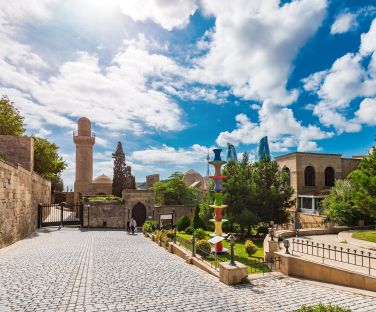
Welcome to Baku – a truly contemporary city criss-crossed by history. From the modern elegance of the Flame Towers standing proudly above to the medieval UNESCO-listed Old City at its core, there is something for everyone in our stunning capital.
Where East meets West
In Baku you will discover a constantly evolving tapestry of life and energy from bazaar to penthouse. Being a coastal city, Baku is intrinsically open-minded and hospitable. Guests are welcome to stroll along the Caspian promenade (the Boulevard), visit the Old City (known locally as Icherisheher) and enjoy the unique architectural blend of East and West.



